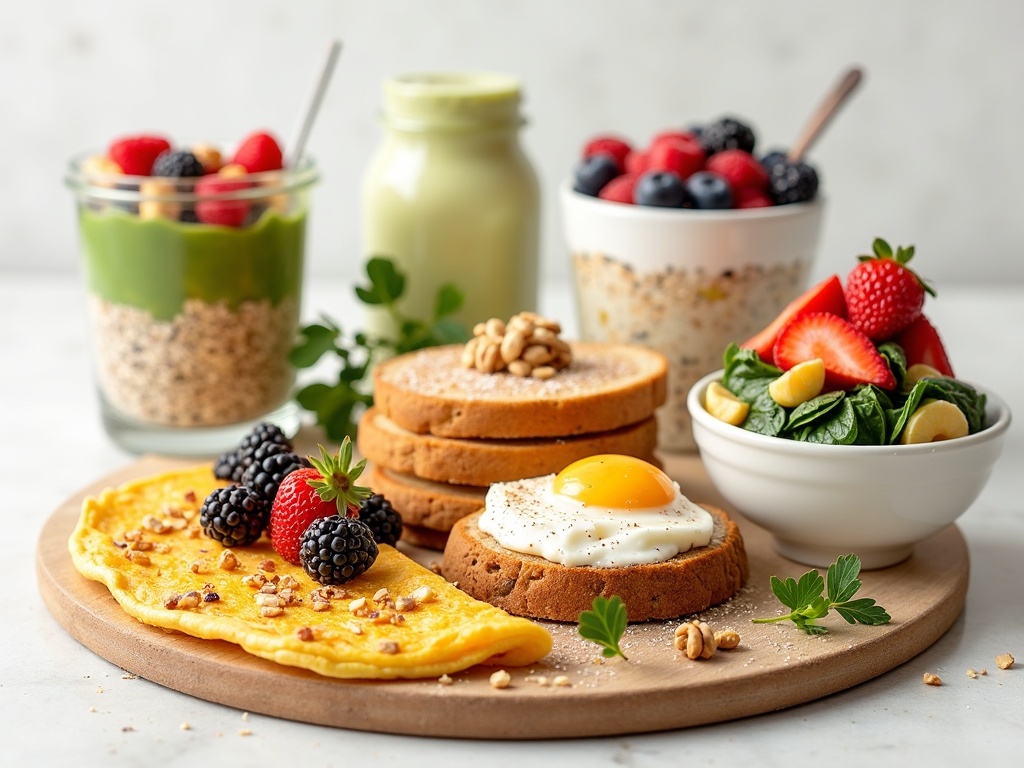Starting your day with a heart-healthy breakfast can reduce heart disease risk by up to 30%, making this morning meal a critical component of cardiovascular wellness. Studies show that breakfast skippers are 4.5 times more likely to develop heart disease, highlighting the importance of prioritizing nutrient-dense options that support stable blood sugar levels and healthy weight management.
Find In This Article
Key Takeaways
- Fiber-rich whole grains like oats help lower cholesterol and provide essential nutrients for heart health.
- Including healthy fats from nuts, seeds, and avocados supports cardiovascular function and helps reduce bad cholesterol.
- Regular breakfast consumption helps maintain stable blood sugar levels throughout the day, preventing inflammation and vessel damage.
- Quick options like overnight oats, smoothies, and avocado toast provide heart benefits even on busy mornings.
- Consistency in breakfast habits leads to better overall diet quality throughout the day and improved cardiovascular outcomes over time.
Why Your Heart Needs a Morning Meal
Starting my day with a nutritious breakfast has become non-negotiable after learning about its impact on heart health. Studies show a 30% reduction in heart disease risk for those who eat breakfast regularly. This significant benefit shouldn’t be overlooked, especially when heart disease remains a leading health concern.
I’ve noticed that when I prioritize breakfast, I naturally consume more essential nutrients throughout the day. Regular breakfast eaters typically have higher fiber, vitamin, and mineral intake compared to those who skip this important meal. These nutrients provide the foundation for cardiovascular health and overall wellbeing.
The statistics are striking – people who regularly skip breakfast are 4.5 times more likely to develop heart disease. This dramatic increase in risk makes that morning meal far more important than simply satisfying hunger.
Blood Sugar and Weight Management Benefits
Eating breakfast helps maintain stable blood sugar levels throughout the day. When I start my morning with a balanced meal, I prevent the sharp insulin spikes that can damage blood vessels over time. This blood sugar control is particularly important for heart health, as unstable glucose levels contribute to inflammation and cardiovascular issues.
A hearty morning meal also supports healthy weight management, another crucial factor for heart health. Starting with nutrient-dense options like baked oats or a bircher muesli keeps me satisfied longer, reducing the likelihood of unhealthy snacking or overeating later in the day.
Heart-Healthy Breakfast Options
The quality of breakfast matters just as much as the habit itself. I focus on including these heart-protective elements in my morning meals:
- Fiber-rich whole grains like oats, which help lower cholesterol
- Healthy fats from nuts, seeds, and avocados
- Lean proteins that support muscle health without excess saturated fat
- Fruits and vegetables that provide antioxidants and additional fiber
For a savory twist, I often prepare savory oatmeal topped with vegetables and herbs. On days when I need extra protein, egg dishes with plenty of vegetables make the perfect heart-healthy start.
When time is short, I don’t skip breakfast – instead, I opt for quick options like a quick pancake recipe using whole grain flour and topped with fresh fruit. Even five minutes of preparation can yield a breakfast that protects my heart for years to come.

Power-Packed Ingredients That Protect Your Heart
The right breakfast can help keep your ticker in top shape. I’ve assembled a list of heart-healthy powerhouses that deserve a spot in your morning meal. These ingredients don’t just taste good—they actively support your cardiovascular system through their impressive nutritional profiles.
Heart-Protective Breakfast Staples
Starting your day with whole grains gives your heart a significant advantage. Foods like oats and barley deliver the minimum 3g daily soluble fiber requirement that helps sweep away cholesterol from your bloodstream. I’ve found that baked oats make this heart-healthy choice delicious and customizable. For a no-cook option, Bircher muesli combines whole grains with other nutritional stars for maximum benefit.
Berries pack a serious punch when it comes to heart protection. Blueberries particularly shine by helping lower both blood pressure and cholesterol levels. I sprinkle them on my savory oatmeal for a sweet contrast that benefits my heart.
Nuts deserve special attention in any heart-focused breakfast routine. Regular consumption reduces heart disease risk by an impressive 30%. A small handful of walnuts or almonds adds satisfying crunch and heart-protective compounds to your morning meal.
Greek yogurt offers protein power with less fat than traditional varieties. This makes it perfect for creating a balanced breakfast that supports heart health without excessive saturated fats. The protein keeps hunger at bay, preventing unhealthy snacking later.
Avocados bring monounsaturated fats to the table—the kind that actively improve heart health metrics. Half an avocado alongside egg dishes creates a satisfying meal that keeps your heart and taste buds equally happy. Other sources of these beneficial fats include olive oil drizzled over toast or used in a quick pancake recipe.
I’ve found combining several of these ingredients creates synergistic benefits. A breakfast bowl featuring Greek yogurt topped with berries, nuts, and a drizzle of honey provides multiple heart-protective compounds in one delicious package. By thoughtfully including these powerful ingredients in your morning routine, you’re making a proactive choice for long-term heart health.
Quick and Easy Heart-Smart Breakfast Ideas
Starting my day with a heart-healthy breakfast has made a world of difference in my energy levels and overall well-being. I’ve compiled some of my favorite morning meals that are not only good for your heart but also quick to prepare when you’re rushing out the door.
Nutrient-Packed Make-Ahead Options
Overnight oats have become my go-to breakfast for busy mornings. I simply combine ½ cup of rolled oats with ¾ cup of unsweetened almond milk, 1 tablespoon of chia seeds, and a handful of mixed berries in a jar before bed. By morning, I have a delicious breakfast with 10g of fiber per serving ready to eat. The soluble fiber in oats helps lower cholesterol levels, while berries add antioxidants that fight inflammation. For variety, I sometimes try baked oats or Bircher muesli which offer similar heart benefits with different textures.
Green smoothies pack a powerful nutritional punch in just five minutes of preparation. My favorite blend includes 1 cup of baby spinach, 1 ripe banana, 1 tablespoon of ground flaxseeds, and 1 cup of unsweetened plant milk. The omega-3 fatty acids in flaxseeds support heart health, while spinach provides potassium that helps regulate blood pressure. I pour this into a to-go cup when I’m really pressed for time, making it the ultimate portable breakfast option.
Avocado toast makes a fantastic heart-healthy choice with just 300 calories per serving. I toast one slice of whole grain bread, spread on ¼ of a ripe avocado, and top it with a poached egg. The monounsaturated fats in avocados help reduce bad cholesterol, while the protein from the egg keeps me full until lunch. For those looking for something with a twist, savory oatmeal makes an excellent alternative with similar heart benefits.
A Greek yogurt parfait provides calcium, protein, and heart-healthy nutrients in one convenient package. I layer ¾ cup of plain Greek yogurt with 2 tablespoons of mixed nuts (walnuts, almonds, and pistachios) and ½ cup of fresh fruit like berries or sliced peaches. The probiotics in yogurt support gut health, which researchers are increasingly linking to cardiovascular well-being. For extra flavor without added sugar, I sprinkle cinnamon on top.
Quick Hot Breakfast Solutions
On cooler mornings, I crave something warm and comforting that still supports my heart health. A quick pancake recipe using whole grain flour and topped with fresh fruit instead of syrup gives me the comfort food feel without compromising nutrition.
Egg dishes also feature prominently in my heart-healthy breakfast rotation. I whip up a quick vegetable omelet using 2 eggs or 1 egg plus 2 egg whites, a handful of chopped vegetables (bell peppers, spinach, and mushrooms), and a sprinkle of feta cheese. The entire meal takes just 10 minutes to prepare but provides lean protein and vegetables with minimal saturated fat. For more egg dishes that support heart health, I experiment with different vegetable combinations and cooking methods.
A bowl of steel-cut oatmeal topped with a tablespoon of almond butter and sliced banana makes another warming option. I prepare a large batch on weekends and reheat portions throughout the week, saving precious morning time while still getting the heart benefits of whole grains.

The Science Behind Breakfast and Heart Health
I’ve found that understanding the connection between breakfast choices and heart health can significantly impact your daily routine. The science is compelling—what you eat first thing in the morning influences your cardiovascular system throughout the day and beyond.
Research consistently shows that people who eat oatmeal regularly have 20-30% lower cardiovascular disease risk compared to those who don’t. This remarkable statistic isn’t just coincidence. Oats contain beta-glucan, a soluble fiber that actively works to reduce LDL cholesterol (the “bad” kind). Starting your day with baked oats or traditional oatmeal creates a foundation for heart protection that lasts well beyond breakfast time.
The American Heart Association has taken a clear stance on breakfast, endorsing meals rich in whole grains, fruits, vegetables, and healthy fats as part of a heart-protective diet. Their recommendations aren’t arbitrary—they’re based on decades of research showing how these food groups support cardiovascular function.
How Breakfast Habits Impact Overall Heart Health
Eating breakfast regularly does more than satisfy morning hunger—it establishes patterns that protect your heart. Studies demonstrate that consistent breakfast eaters tend to have better overall diet quality throughout the day. When I start my morning with nutritious breakfast options, I’m more likely to make healthier choices at lunch and dinner.
The morning meal plays a crucial role in several heart health factors:
- Weight management: A balanced breakfast helps control appetite and reduces overeating later, supporting healthy weight maintenance—a key factor in heart disease prevention.
- Blood sugar regulation: Options like bircher muesli provide steady energy rather than sugar spikes, reducing diabetes risk (a major heart disease contributor).
- Inflammation reduction: Heart-healthy breakfast proteins from egg dishes (in moderation) provide essential amino acids that help repair tissues and reduce inflammatory markers.
- Metabolic benefits: A savory oatmeal with vegetables kickstarts metabolism early, improving how your body processes nutrients throughout the day.
Breakfast timing matters too. Eating earlier allows your body more time to metabolize food efficiently. This pattern supports healthy blood pressure and cholesterol levels—both critical indicators of heart health. Your body’s circadian rhythms are optimized for food processing in the morning hours, which is why a quick pancake recipe made with whole grains can be far better for your heart than skipping breakfast altogether.
The positive effects compound over time. Research indicates that those who maintain regular, nutritious breakfast habits for years show measurably better cardiovascular outcomes. This includes reduced arterial stiffness, lower inflammatory markers, and improved cholesterol profiles.
What’s particularly compelling is how accessible heart-healthy breakfasts can be. You don’t need fancy ingredients or complicated recipes—simple, whole foods combined thoughtfully can provide the nutrients your heart needs. Even time-strapped mornings can accommodate heart-supporting options that take just minutes to prepare.
The evidence is clear: breakfast isn’t just another meal—it’s a powerful opportunity to strengthen your heart health each day. By making informed choices about what goes on your breakfast plate, you’re taking a proactive step in cardiovascular disease prevention that pays dividends far into the future.
Making Heart-Healthy Choices Last
Starting my day with a heart-healthy breakfast has become more than a habit—it’s my foundation for better cardiovascular health. The choices I make each morning directly impact my heart’s wellbeing, and with some strategic planning, I’ve found ways to make these nutritious options both delicious and sustainable.
Building Your Daily Heart Protection Plan
I focus on getting at least 3g of soluble fiber daily through whole grains, which has been shown to help lower cholesterol levels. Nutritious breakfast options like oatmeal are perfect for this—I prepare baked oats with cinnamon and fresh berries for a warm, fiber-rich start. For variety, I rotate in Bircher muesli which combines oats, yogurt, and fruit for an easy overnight option that’s ready when I wake up.
Colorful fruits add crucial antioxidants that fight inflammation and protect heart health. I add berries to my oatmeal, slice bananas onto whole grain toast, or blend spinach with frozen mango for a green smoothie. The different colors represent various protective compounds, so I aim for at least two different fruits each morning.
Protein is essential for maintaining muscle mass and keeping me satisfied until lunch. I incorporate:
- Greek yogurt topped with berries and a sprinkle of flaxseeds
- Egg dishes like veggie omelets or scrambles (limiting to 4-7 eggs weekly)
- Tofu scrambles seasoned with turmeric and black pepper
- Savory oatmeal with a poached egg and avocado
Healthy fats deserve a place in my heart-protective breakfast too. I sprinkle walnuts or almonds on my yogurt or oatmeal, spread avocado on whole grain toast, or add a tablespoon of ground flaxseed to my smoothie. These fats help absorption of fat-soluble vitamins and provide omega-3 fatty acids that support heart function.
Portion control remains key—even with healthy foods. I use smaller plates and bowls to naturally limit portions without feeling deprived. For busy mornings, I prep ingredients the night before or make quick pancake recipes using whole grain flour and freeze extras for easy reheating.
Consistency in timing has also made a difference in my heart health journey. By eating breakfast within an hour or two of waking, I’ve found my energy levels stay more balanced throughout the day, which helps prevent overeating later. This routine helps maintain healthy blood sugar levels and reduces stress on my cardiovascular system.
I’ve found that the best heart-healthy breakfast plans allow for flexibility. Some mornings call for a quick smoothie, while weekend mornings might mean a more elaborate egg and vegetable scramble with whole grain toast. The key is maintaining the principles of fiber, protein, healthy fats, and portion control regardless of what specific foods I choose.
By making these heart-protective choices consistently, I’ve created a sustainable approach to breakfast that supports my cardiovascular health without feeling restrictive. These morning meals have become something I look forward to rather than a chore—proving that heart-healthy eating can be both enjoyable and effective.
Sources:
American Journal of Clinical Nutrition
The Journal of Nutrition
American Heart Association

